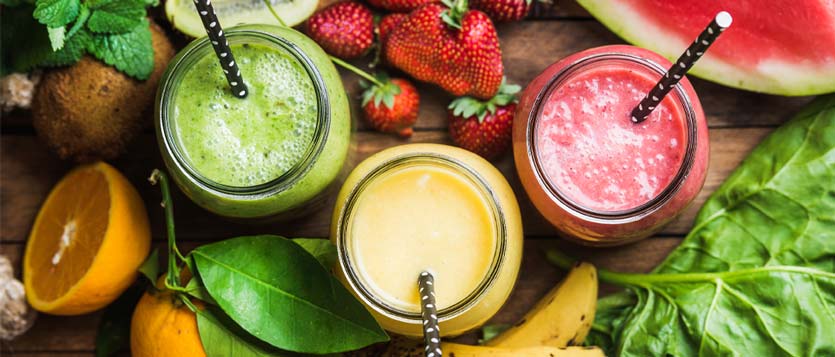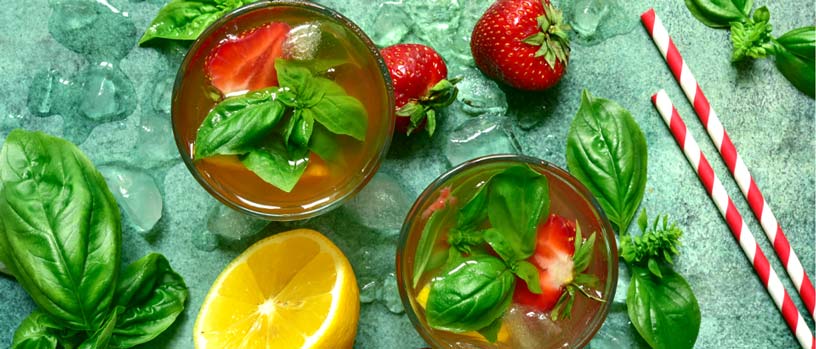June 1, 2022
You’ve been drinking liquid your whole life (you are human, right?), but have you ever stopped to wonder what the drinks you consume are actually doing to your body? It’s easy to just snag a drink from the fridge, and at most, be concerned with what the calorie count is, but what about the other effects it is having on your body? The answer to this question and more is why we’re offering this thirst-quencher breakdown.
High-Quality H20
This may come as no surprise, but if you are looking for the best way to stay hydrated and healthy, water is always the number one go-to. Not only does water help to hydrate your body, but it also regulates your body temperature and prevents infection. When it comes to consumption, a healthy man should be drinking about 125 ounces of fluid per day and a woman should drink around 90 ounces. It is a good idea to talk to a healthcare professional about how much water makes sense for your individual body composition, activities, environment and diet.
But Can I Ever Just Skip Water Altogether?
Fruits, vegetables, yogurt, and other foods that contain water, as well as coffee, tea, juices, and sports drinks, all contribute to your overall fluid intake. So why not just drink those instead and skip water? Stop right there. You may want to give it some additional thought before ditching your water bottle for good. Your body is made up of 60 percent of water and its processes rely 100 percent on water. From using water in your cells, organs, and even tissues to help regulate its temperature and maintain other bodily functions, water is irreplaceable and should always be your go-to beverage. That being said, you are human and only drinking water every day is tough. There’s plenty you can do with water to make it flavorful and fun. Infused water can offer quite a few health benefits, depending on the fruits and herbs you use. The trick with infused water compared to just lemon in your water is it’s best to let it sit for a few hours to allow the flavors to infuse. The longer it sits, the more flavorful the water can be. You can keep it simple or add your favorite fruit together. Your options are endless!
Try this out: Strawberry, Lemon and Basil Water
What You’ll Need:
- 2 cups sliced strawberries
- 1 lemon, peel removed, sliced
- 1/2 cup fresh basil leaves, torn
How You Make it: Place cold water, strawberries, lemon and basil leaves in a large pitcher. Place in the fridge for 1-2 hours to infuse and chill. Strain out solids, if desired.
Tea and Coffee

Tea and coffee are natural substances, and when you drink these on their own (without add-ins like sugar, creamer, milk, etc.) they possess greater health benefits than if you add additional substances. Coffee, for example, may have the potential to reduce the risk of many diseases including type 2 diabetes and liver cancer. Additionally, due to being rich in antioxidants, there may be some benefits to general heart health.1 Tea has been shown to have great health benefits as well, possessing antioxidants and helping to reduce the risk of heart attack, stroke and cancer, while keeping bones healthy, boosting the immune system and even soothing the digestive system.2
Caffeine consumption for the average person per day is typically around 300-400 milligrams. That's approximately 2-4 medium-sized cups (160-180 milligrams) of coffee each day. Consuming too much caffeine in one day may lead to increased heart rate, raised blood pressure, anxiety or trouble falling asleep. Before increasing your daily coffee intake, be sure to chat with your health care provider about how much caffeine you should be consuming each day.
It’s important to monitor your daily caffeine intake and keep it within recommended amounts. Keep in mind that not only does the recommended caffeine intake vary from person to person, but caffeine is also a psychoactive substance (a drug that crosses the blood-brain barrier to stimulate the central nervous system). The health differences between soda, tea, and coffee, which all contain caffeine, depend on multiple factors. From their general ingredients to the add-ins (sugar, creamer, milk, etc.), you should know all the ingredients and nutritional value in the drink before you can determine how truly healthy it is.
KEEP READING: Health Benefits of Coffee
Fruit Juice
Though the name may be misleading, fruit juices aren’t necessarily a healthy option. In fact, the consensus among health experts is that you should eat your fruit rather than drink it. While fruit juice can be part of a healthy diet, it has less dietary fiber than whole fruit, and when consumed in excess, fruit juice can contribute extra calories to your everyday nutritional intake.
It is essential that you make sure that you read your fruit juice labels, and most importantly, that you are not entirely replacing your fruit intake with fruit juices. When juices are consumed, make sure they are 100 percent juice with no added sugars.
For diabetics, it is recommended that you avoid fruit juices altogether. All juices, even those without added sugar, have a high sugar content due to its concentrated source. An average cup of 100 percent juice has about 28 grams of sugar in an 8-ounce serving. The recommended amount of sugar for women is 25 grams of sugar per day and 36 grams of sugar per day for men. This means you are almost getting your entire day’s sugar intake from just an 8 eight-ounces.3
Homemade Smoothies

Smoothies are flexible and adaptable to whatever you want to throw in! Typically, they are creamy beverages usually blended from fresh or frozen fruits, vegetables, juices, yogurt, nuts, seeds and/or dairy or nondairy milk. Many people consume smoothies as a morning meal or afternoon snack. Smoothies can be a great way to incorporate more healthy foods into your diet by boosting your intake of fruits and vegetables. Which by doing so follows a number of benefits such as an increased fiber intake, boosted vitamin C levels and may help with conditions like high blood pressure.
MedExpress Pro Tip: Balance the sugar in fruits with dark leafy green vegetables, like kale or spinach - which can deliver a healthy dose of fiber, vitamins A and C, calcium, iron and other nutrients.
The secret to a perfect nutrient-packed smoothie is to have a serving of veggies (spinach, kale, cauliflower, zucchini and carrot are good options), as well as a serving of some type of fruit or multiple fruits (frozen fruit is ideal for a thicker texture). Add about 1-2 tablespoons of extra add-ins which could include chia, hemp or flaxseed. Lastly, the liquid portion can be plant-based milk, coconut water, fresh juice or even water. Check out these two recipes for smoothies below, blend all the ingredients up and enjoy!
Strawberry Banana Smoothie
- 1 frozen banana
- 1 cup strawberries (fresh or frozen)
- A handful of fresh or frozen spinach
- ½ cup unsweetened Greek yogurt
- 1 cup unsweetened milk (nut, soy, animal)
Green Goddess Smoothie
- ½ a frozen banana
- ½ cup green grapes
- 1 kiwi, peeled
- 1 cup baby spinach leaves
- ½ cup ice
- 1 cup unsweetened milk (nut, soy, animal)
Sports Drinks
Sports drinks come in many forms, including ready-to-drink beverages, powders and tablets. They help to replenish water, electrolytes and energy lost during exercise. While water is the most logical form of hydration, people often think to reach for a sports drink. Sports drinks contain sugar and electrolytes like sodium and potassium that can help replace what you lost during longer-duration workouts, especially in the heat.
Drinking a sports drink while exercising is what the drink was originally designed for. But due to the delicious flavor, people have taken to drinking sports drinks casually. This is not a recommended choice, as sports drinks contain a significant amount of calories, mostly from sugar. To someone who does not follow a regular high-intensity workout routine, the added nutrients provide no additional benefits and can lead to slight weight gain over time.
If you are going to be participating in a sport or rigorous exercise, a sports drink is a viable option. Otherwise, remember that the flavoring and added sugar are not something your body needs as a casual drink.
MedExpress Pro Tip: Coconut water is a great alternative to a sugary sports drink. It is filled with potassium, sodium and magnesium and is often lower in calories.
When you are choosing a beverage, your decision will likely come down to what you are in the mood for, what your body needs or what is readily accessible. The key is understanding how your choice will interact with your age, gender, weight, climate, activity levels and your overall health. Take the time to consider what you need to be drinking more regularly to maintain your health.
Originally published July 2018. Updated June 2022.
References:
1 Healthline: Science: Coffee is the World's Biggest Source of Antioxidants. Last updated February 20, 2019. Accessed April 4, 2022.
2 Livestrong.com: The Antioxidant Levels in Black, Green & White Tea. Last updated May 14, 2021. Accessed April 4, 2022.
3 HHS and USDA: 2020–2025 Dietary Guidelines for Americans. Last updated December 2020. Accessed April 4, 2022.

